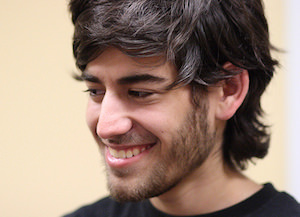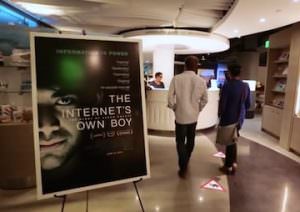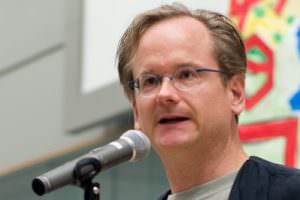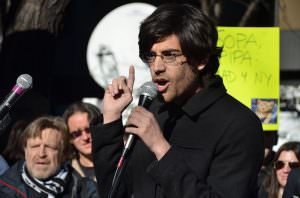Truthdigger of the Week: Aaron Swartz
Was Aaron Swartz, beloved friend, activist and computer programmer, a casualty of the U.S. government’s vigorous campaign to silence champions of Internet freedom?Was Aaron Swartz, beloved friend, activist and computer programmer, a casualty of the government’s campaign to silence champions of Internet freedom?
On Saturday Jan. 12, the Internet grieved at the news that 26-year-old Aaron Swartz, writer, software programmer and champion of Internet freedom, committed suicide in his Brooklyn apartment.
Swartz’s death stunned many who sensed the possibility of a better future through the work of a man who had already achieved much by his mid-20s. When barely a teenager, Swartz helped develop RSS, the near ubiquitous Internet program that streamlined users’ access to frequently updated online publications. He was one of the early architects of Creative Commons, an alternative copyright system that qualifies intellectual property at various levels of free use. And in his late teens he played a crucial role in the creation of Reddit, an immensely popular social networking news site.
A future of riches and status, a life that beckons many young, successful Internet entrepreneurs, seemed to be his for the taking. But Swartz didn’t bite. Instead, he devoted himself to activism. Through Demand Progress, one of the pro-democracy groups he co-founded, Swartz helped to defeat SOPA, a bill sponsored by the entertainment industry that would have empowered the government to censor parts of the Internet. Author Cory Doctorow, Boing Boing editor and friend to Swartz, described this era of Swartz’s life as his true “coming of age.”
Throughout his teenage and adult years, the budding activist wrote volubly and passionately about Internet freedom, civil liberties and free access to information. As the grief that flooded the Internet after his death showed — from remembrances written by friends to the appearance in article comment sections of periods (“.”) representing moments of silence — he was beloved, widely respected and admired for these achievements.
In the year and a half leading up to his death, Swartz faced prosecution potentially leading to felony convictions that carried punishments of decades in prison and millions of dollars in fines. His crime was allegedly entering an MIT computer closet and downloading some 4 million articles from the digital academic publisher JSTOR. The archive charges subscription prices for articles from a wide variety of journals, some written by professors at publicly funded universities, and the scholars are often not reimbursed for the sales. This secreting away of knowledge offended Swartz’s sense of community obligation. In a 2008 manifesto, he wrote compellingly about the “private theft of public culture”:
“Information is power. But like all power, there are those who want to keep it for themselves. The world’s entire scientific and cultural heritage, published over centuries in books and journals, is increasingly being digitized and locked up by a handful of private corporations.”
Those who seek to return these treasures to the public trust are slandered by society’s leaders as thieves and pirates and forced to operate underground, “as if sharing a wealth of knowledge were the moral equivalent of plundering a ship and murdering its crew. But sharing isn’t immoral,” he urged, “it’s a moral imperative. Only those blinded by greed would refuse to let a friend make a copy.”
Corporations and the politicians who serve them are blind, he argued. Together they craft laws that they use to monopolize society’s physical and intellectual goods, depriving the rest of us of their benefits as a consequence.
“There is no justice in following unjust laws,” Swartz said. “It’s time to come into the light and, in the grand tradition of civil disobedience, declare our opposition to this private theft of public culture.”
“We need to take information, wherever it is stored, make our copies and share them with the world. We need to take stuff that’s out of copyright and add it to the archive. We need to buy secret databases and put them on the Web. We need to download scientific journals and upload them to file sharing networks. [Italics added.] We need to fight for Guerilla Open Access.”
This vision was not meant to be merely an idealist’s dream. “With enough of us, around the world, we’ll not just send a strong message opposing the privatization of knowledge — we’ll make it a thing of the past.”
Swartz was more than talk. In an essential piece on the deep, social significance of his life published the day after his death, Guardian columnist and former constitutional and civil rights lawyer Glenn Greenwald unabashedly described Swartz as a hero. In the tradition of ancient Greek drama, tragic heroes were imperfect but virtuous people — usually young men or women — who unwittingly sacrificed themselves for the good of the tribe. Unaware of the fate that awaited them, they fell from good fortune to bad by way of some major flaw. The hero’s death evoked pity, sympathy, empathy and compassion in the audience, which had the chance to draw its own moral benefit from what it saw.According to Doctorow, Swartz’s flaw was his “recklessness.” For this, in the JSTOR case, Obama-appointed U.S. Attorney Carmen M. Ortiz, who is “notorious for her overzealous prosecutions,” according to Greenwald, brought the full force of the law against Swartz, even after JSTOR dropped all of its charges.
With equal force, Swartz’s supporters are focusing their rage on Ortiz and the Justice Department, for pursuing a punishment that is disproportionate to Swartz’s alleged offense. At least two online petitions have emerged. One asks President Obama to posthumously pardon Swartz. The other demands that Ortiz be fired.
Many are asking why prosecutors were so aggressive. Greenwald believes it was his vigorous dissent against “the most powerful state and corporate factions” in the world:
“Swartz’s activism … was waged as part of one of the most vigorously contested battles — namely, the war over how the internet is used and who controls the information that flows on it — and that was his real crime in the eyes of the U.S. government: challenging its authority and those of corporate factions to maintain a stranglehold on that information. In [an] above-referenced speech on SOPA, Swartz discussed the grave dangers to internet freedom and free expression and assembly posed by the government’s efforts to control the internet with expansive interpretations of copyright law and other weapons to limit access to information.”
Timothy Berners-Lee, a British computer scientist known as the inventor of the World Wide Web, argued in 2011 that by the prosecution’s logic, anyone who violated a website’s terms of use agreement could be labeled a felon. Even if all the allegations against Swartz were true, the only real crime he committed was basic trespassing, for which offenders are punished with 30 days in jail and a $100 fine at most. “That seems about right,” Lee wrote. “[I]f he’s going to serve prison time, it should be measured in days rather than years.”
In an official statement, Swartz’s family blamed the Massachusetts U.S. Attorney’s office and MIT for “contributing to his death.” The university had “refused to stand up for Aaron and its own community’s most cherished principles,” while the “criminal justice system” that pursued him was “rife with intimidation and prosecutorial overreach.”
Some who were involved in Swartz’s case are trying to correct the record. Alex Stamos, a computer forensics investigator who was scheduled to serve as the defense’s expert witness, wrote in detail about bad information pertaining to the details of the JSTOR event that were being repeated throughout the blogosphere. Stamos also refuted the characterization of the crime and the severity of the punishment: “I know a criminal hack when I see it, and Aaron’s downloading of journal articles from an unlocked closet is not an offense worth 35 years in jail.”
Copyright activist and academic Lawrence Lessig (who first met Swartz when he was a budding teenage developer) declined to defend his friend’s actions, but he forcefully denounced “what a decent society would only call bullying.”
“I get wrong,” Lessig wrote, “but I also get proportionality. And if you don’t get both, you don’t deserve to have the power of the United States government behind you.
“[R]emember, we live in a world where the architects of the financial crisis regularly dine at the White House — and where even those brought to ‘justice’ never even have to admit any wrongdoing, let alone be labeled ‘felons.’
“Aaron was always and only working for (at least his conception of) the public good,” Lessig continued. “He was brilliant, and funny. A kid genius. A soul, a conscience, the source of a question I have asked myself a million times: What would Aaron think? That person is gone today.”
For acts of heroism carried out during his life, which improved our world in broad, tangible and lasting ways, we honor Aaron Swartz as our Truthdigger of the Week.
Aaron Swartz, ‘How We Stopped SOPA’:
Your support matters…
Independent journalism is under threat and overshadowed by heavily funded mainstream media.
You can help level the playing field. Become a member.
Your tax-deductible contribution keeps us digging beneath the headlines to give you thought-provoking, investigative reporting and analysis that unearths what's really happening- without compromise.
Give today to support our courageous, independent journalists.




You need to be a supporter to comment.
There are currently no responses to this article.
Be the first to respond.